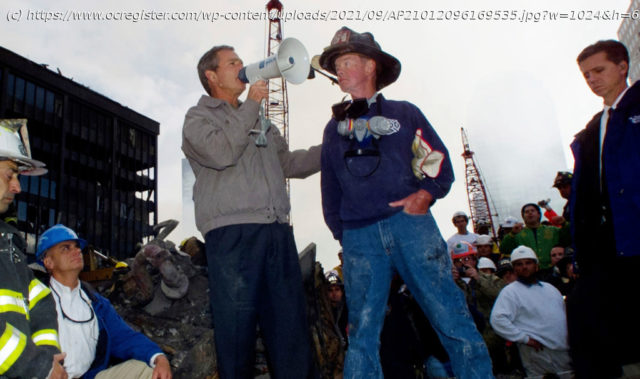The country’s failure to coalesce amid another national tragedy – albeit one wholly different from 9/11 — reveals the cultural, ideological and political schisms that have metastasized over the pas…
As the sun set over Washington, D.C., on Sept.11,2001, about 150 members of Congress, representing both parties, stood on the steps of the Capitol building. They came together to reassure their fellow Americans after the terrorist attacks killed nearly 3,000 people. Then, without prelude, a gaggle of Congress members began singing “God Bless America.” Others joined in. The serenade grew louder. And soon, the entire bipartisan delegation became a chorus offering the nation a cathartic moment of unity. “It’s probably the most united I’ve seen Congress,” said Rep. Ken Calvert, R-Murrieta, who has served in the House of Representatives since 1993. Nearly 20 years later, on Jan.6, Calvert and the rest of Congress witnessed another seminal moment in the Capitol’s history: Insurrection. A throng of former President Donald Trump’s most ardent supporters, enraged by the unproven claim that the Republican lost his reelection bid because of fraud, stormed the Capitol building to stop Congress from certifying then President-elect Joe Biden’s victory. Five people died. That moment, in many ways, was a climactic flashpoint after what was perhaps the most turbulent year in America since 2001. But it was the country’s failure to coalesce amid another national tragedy – albeit one wholly different from 9/11 — that revealed and possibly enhanced the cultural, ideological and political schisms that have metastasized over the past 20 years. “The biggest takeaway about U.S. public opinion in the first year of the coronavirus outbreak,” the Pew Research Center wrote in a review of the pandemic it published in March, “may be the extent to which the decidedly nonpartisan virus met with an increasingly partisan response.” The answer to why the country has become so divided, according to experts and various data, is complex. But it includes, experts say, failed leadership, the pernicious rise of social media that amplifies the voices of discord that have always existed – and, perhaps, the pandemic itself. American tragedies The public responses to 9/11 and the coronavirus pandemic have a few instructive parallels. Initially, for example, Americans largely came together to repel a common enemy. Support for first responders swelled during each crisis. The now-infamous Patriot Act had wide bipartisan support. Early last year, most Americans supported state and local efforts to curb the pandemic’s spread, according to the Pew Research Center. President George W.
Домой
United States
USA — Political Once united, America has grown more divided since the 9/11 attacks






